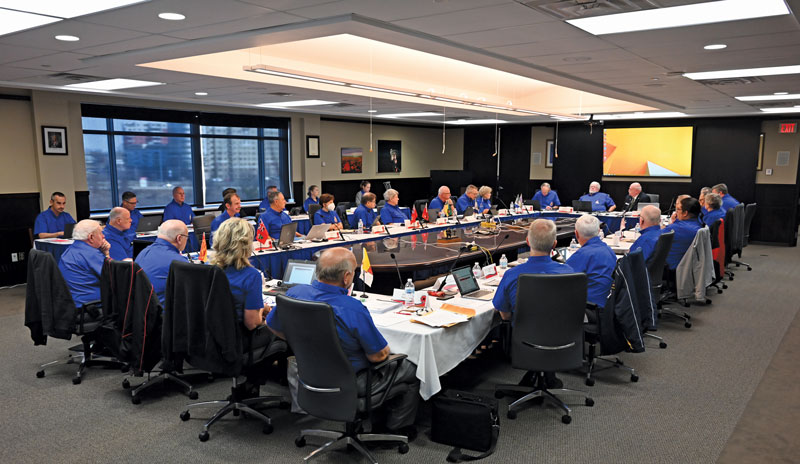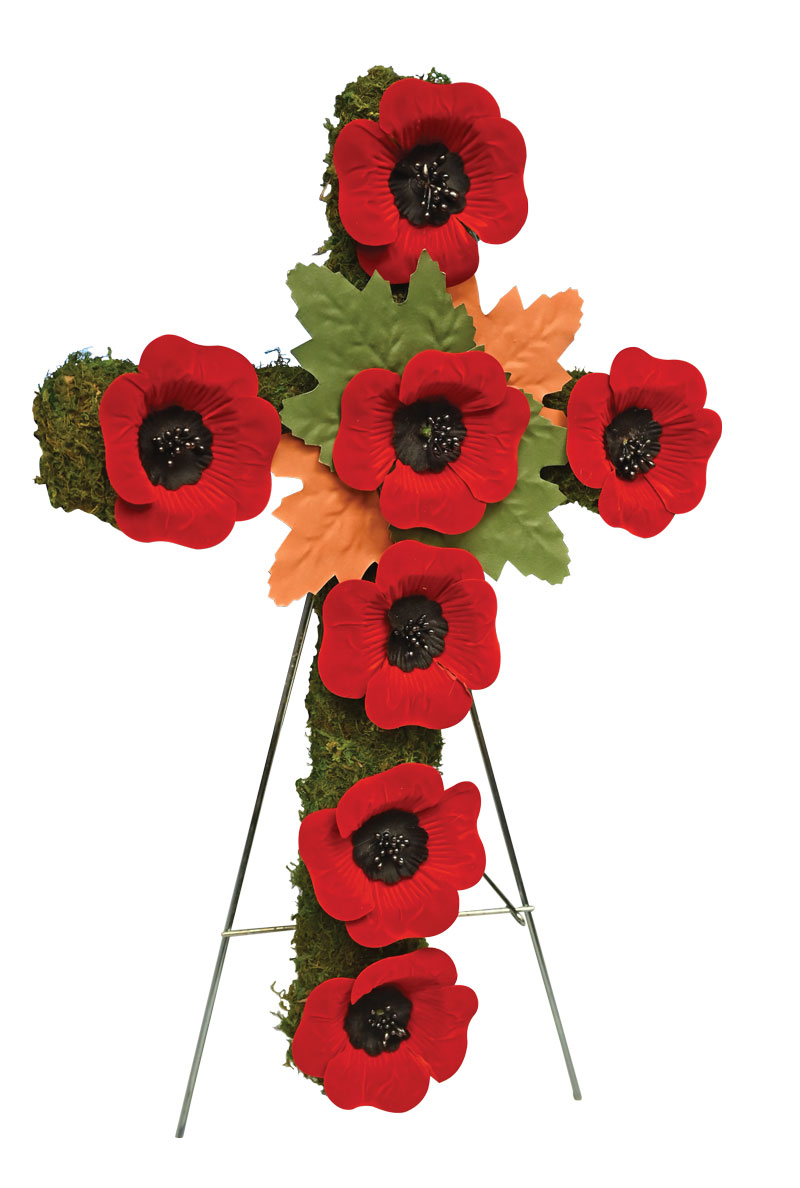At its second in-person meeting in three years, The Royal Canadian Legion’s Dominion Executive Council (DEC) discussed the continuing challenges facing the organization due to COVID-19, as well as the opportunities it presented for new initiatives. There was an air of positivity surrounding the Legion’s post-pandemic future and four items stood out from the group’s discussions: poppies, remembrance, membership and veterans.
“It’s actually great to see all of you today,” said Grand President Larry Murray. “You helped make a big difference for veterans and their families during trying times, and you have also contributed significantly to helping ensure that The Royal Canadian Legion is well positioned to continue its important mission across Canada for another 100 years.”
“For the last two and a half years, we have been concentrating on reacting to situations not of our making and out of our control,” continued Dominion President Bruce Julian in his welcoming statement. “It is difficult to emerge from a situation that just keeps hanging on. Our branches need to be encouraged to be out there, to shake off the last couple of years. This summer is an opportunity to hit the ground running.”
DEC hit the ground running itself with two highlight announcements.
At the day-and-half meeting, the Legion announced plans to start distributing 100 per cent biodegradable poppy products, including the ubiquitous lapel poppy, as well as remembrance wreaths, crosses and similar items.
To be launched this fall, the eco-friendly lapel poppy is made of pressed paper and cotton velvet. While the new items will be available this autumn, existing plastic poppies will still be in circulation; it’s expected to take a few years to implement the change.
Meanwhile, Legion members and the public can also expect to see further improvements to the RCL’s online Remembrance Day ceremony locator this fall. It was introduced on Legion.ca ahead of last year’s remembrance period to promote local branch ceremonies. Between Oct. 1 and Nov. 30, 2021, 328 events were highlighted.
DEC unanimously approved $17,500 for additional enhancements to the platform for 2022, which will include making the system more user-friendly for the public and individual branches and streamlining administrative issues at all command levels.
“You helped make a big difference for veterans and their families during trying times.”
In overall money matters, Dominion Treasurer Rick Bennett reported that Dominion Command ended 2021 with an operating surplus of $290,811. (The 2020 surplus was $1,344,305.) Investment returns were $452,625 in 2021, exceeding the budget by $23,169 despite market volatility—though the returns continue to be compounded by the drawdown of reserve funds for the $3-million Branch Emergency Fund.
The Supply Department finished the year with $3,001,664 in sales, surpassing revenue expectations by $376,664. Supply sales are also up by 20 per cent in early 2022.
RCL committee expenses were under budget again this year (by $422,623), largely due to travel and event cancellations. Member sports were $323,653 under budget and track and field was $220,153 under budget. The Dominion championships for darts, cribbage and eight ball were all cancelled again for 2022 due to the pandemic.
Meanwhile, Member Services expenses exceeded budget by $56,163, again, as in 2020, due largely to increases in credit card and mail processing fees and extended hours of operation.
The marketing and communication budget was over by $247,843, mostly owing to a previously unplanned but DEC-approved marketing grant of $150,000 and increased costs for social media planning. The additional promotion proved successful, though, generating 3,057 new
five-year memberships, worth nearly $800,000.
The positive membership news didn’t end there.
For one of the few times in more than three decades, membership showed year-over-year growth in the first quarter of 2022. At the end of March, membership was up five per cent, about 9,700 more members than in 2021. Dominion First Vice-President Owen Parkhouse, the Membership Committee chair, noted that the numbers were continuing to climb, standing then at 12,000. “We are not out of the woods yet,” said Parkhouse, “but we are seeing momentum in membership.”
With the aim to continue that growth, DEC approved two additional initiatives. The first will expand the current one-year free membership for the Veterans Family Welcome Program to include parents and guardians of veterans. Some 500 family members have taken advantage of this project to date. The second item will extend honorary life membership, effective retroactively, to Memorial (Silver) Cross recipients.
Total paid membership in 2021 was 234,615, down by 13,812 members (5.6 per cent) compared to 2020, so the work continues to be a priority.
Naturally, veteran issues also continue to take precedence, and while the Veterans, Service and Seniors Committee did not present any action items, there was important discussion around its advocacy work, as well as that of RCL headquarters staff. Committee chair Julian also briefly summarized the outcomes of the veterans’ consultation assembly (see “Ombud urges VAC to triage, prioritize vets by need” on page 63 for more), held the previous weekend, April 23. Noted Julian: “The Legion is by far the best organization in this country for getting results for veterans.”
“Our members have thought outside the box to ensure the needs of all veterans were unequivocally met.”
The Legion also continues to get results with its use of the poppy emblem. In addition to the biodegradable product announcement, Poppy and Remembrance Committee chair Berkley Lawrence noted in his report that the group continues to both strengthen and expand corporate partnerships, including exploring a pilot project with Starbucks in which poppy donations would be collected through its point-of-sales system, then transferred to local branches.
Lawrence also announced a streamlining of the number of “Pay Tribute” tap-enabled donation boxes for 2022. In last year’s pilot project, only 700 of the 1,000 boxes distributed were in use, so the committee is developing a request form for the system with the goal of ensuring only branches that want to use it will get it. The boxes generated more than $190,000 in 2021.
DEC also approved a range of amendments to the Poppy Manual, in addition to granting funding for two influential veterans’ programs. Initially allocated a total of $599,700 over three years in 2021, the Heroes in Mind, Advocacy and Research Consortium, which supports research to benefit the health and well-being of Canadian veterans, public safety personnel and their families, was approved for year-two funding of $199,900.
Funding of $35,000 was likewise authorized for Heroes Mending on the Fly, which supports disabled veterans across the country through fly fishing and related pursuits. The Legion continues to be a principal funder of the program and many DEC members spoke highly of its impact in their local communities.

The Legion’s new biodegradable poppy products were among the many items discussed at the latest Dominion Executive Council meeting [Aaron Kylie/LM]
Defence and Security Committee chair Andrea Siew provided DEC with several updates on her group’s important work. Principal among the committee’s actions was an unanimously approved motion that the Legion support ongoing recognition and commemoration of the contributions of Persian Gulf War veterans.
DEC similarly adopted a recommendation that the RCL request the minister of veterans affairs, in conjunction with the minister of public safety, to amend the current definition of a veteran for commemoration purposes to include the RCMP.
Finally, the committee accepted a recommendation by which the Legion would request a review on the impact of high housing costs for CAF members—and the steps needed to address the issue.
Another notable action was the DEC’s acceptance of the Platinum Jubilee lapel pin, created to mark the 70th anniversary of Queen Elizabeth’s accession to the throne. Until Dec. 31, 2022, the pin can be worn on Legion dress on the inside of the We Support Our Troops pin. The Jubilee pins are free to all Canadians through the Monarchist League of Canada (though shipping charges apply).
Sports Committee chair Brian Weaver reported that, despite the cancellation of the 2022 member sports championships (cribbage, darts and eight ball) due to the pandemic, host locations for those sports were offered 2023 events instead (and likewise 2023 hosts were offered 2024 events). All host locations accepted the changes.
The 2022 Legion National Youth Track and Field Championships, meanwhile, will proceed as scheduled from Aug. 3-9 in Sherbrooke, Que., which will also host the athletes again in 2023. Calgary will host the event in 2024 and 2025, while a bid process for a host city in 2026 and 2027 will begin next year.
Convention Committee chair Julian reported that the 2024 Dominion Convention is confirmed for Aug. 24-28, 2024, in Saint John, N.B. The 2026 event will be in Winnipeg and will include Legion centenary celebrations. Saskatoon is slated to host the 2028 convention.
Parkhouse, chair of the Centenary Committee, reported that plans continue for the Legion’s 100th anniversary in 2026. The special logo unveiled last year has been updated and DEC approved $100,000 in funding to initiate the committee’s formal planning. Discussions are ongoing with the Canadian Heraldic Authority for a coat of arms, the Royal Canadian Mint for a centenary general circulation coin and Canada Post for a centenary commemorative stamp.
Reports by provincial command presidents revealed a common theme: as the pandemic, hopefully, winds down, the Legion’s nationwide work is once again ramping up.
“Our members have thought outside the box to ensure the needs of all veterans were unequivocally met,” said John Mahon of Alberta/NWT Command, noting that that all branches in his region survived the challenges of the past two-plus years.
Valerie MacGregor of B.C./Yukon Command reported that the first of two phases of the command’s flagship project, Legion Veterans Village, a 20-storey mixed-use building in North Surrey, B.C., is scheduled to be completed in late 2022. It will include a centre of excellence on mental health for veterans and first responders, a rehabilitation and health centre, housing units and commercial space.
Keith Andrews of Saskatchewan Command shared that his province’s government has earmarked $1.5 million for the Saskatchewan Veterans Service Club Support Program, which is administered by his team.
Garry Pond of Ontario Command noted that his command’s Homeless Veterans Program achieved a “bittersweet success,” helping to get its 1,000th veteran off the street. Nearly $3 million has been invested in the project, which includes northwestern Ontario in collaboration with Manitoba/NWO Command.
Kenneth R. Ouellet of Quebec Command, meanwhile, highlighted two particularly noteworthy endeavours in his region, the veterans licence plates (nearly 40,000 veterans in the province have been issued the graphic plates) and the parking for veterans program, in which 15 municipalities in Quebec reserve prime parking spaces for those who’ve served.
Nathan Lehr of Newfoundland and Labrador Command summed up the recent challenges the RCL has faced succinctly: “Through it all we have learned to adapt. These are changing times and I feel confident with the people and support around me.”
Advertisement






















